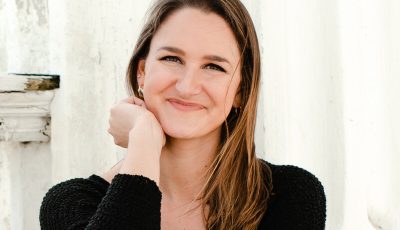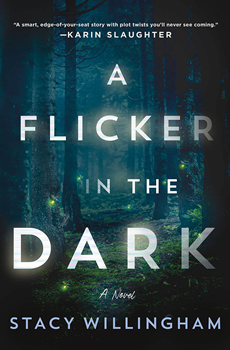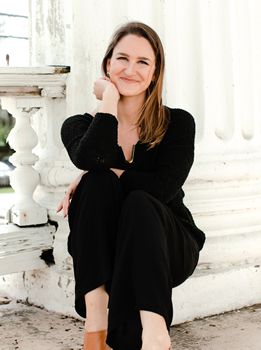

BookTrib Spotlight: Stacy Willingham
A Serial Killer’s Daughter Fights Her Past
I thought I knew what monsters were. [But] monsters didn’t hide in the woods; they weren’t shadows in the trees or invisible things lurking in darkened corners.
No, the real monsters moved in plain sight.
The speaker in Stacy Willingham’s A FLICKER IN THE DARK is Chloe Davis. She was twelve the hot July day in her small Louisiana town when the girls, not much older than she, started to go missing. By the end of the summer, six of them were gone; panic was everywhere; and that’s when Chloe found the box in her father’s closet, the one containing keepsakes from all the victims.
It shattered everybody’s lives. Her father was sent to prison, and her mother tried to commit suicide; her older brother, Cooper, shut down, and Chloe suffered panic attacks, insomnia, nyctophobia: “The two of us together were childhood trauma wrapped in a bow and placed delicately on the doorsteps of every doctor in Louisiana. Everybody knew who we were; everybody knew what was wrong with us.”
Now, 20 years later, Chloe is a medical psychologist treating the traumas of others, a respected professional, engaged to get married, the happiness she has worked so hard to attain now within her grasp. But it is a very fragile condition. She still looks at people she meets, wondering what they’re hiding, what they aren’t telling her. She still has trouble sleeping, imagining the things that could happen to her in the dark. If she needs an occasional Xanax to help her keep control, that’s understandable, isn’t it?
And then it starts happening again. A teenage girl disappears, and then another one. Keepsakes from both are missing, and the second girl was one of Chloe’s patients—in fact, her body was found in the alleyway behind Chloe’s office. A newspaperman points out the similarities, but that’s absurd. A copycat? A message meant for her?
The more the investigation proceeds, though, the more the parallels pile up, and the more the things she thought she knew turn out to be wrong. What does she really know about her fiancé, about his family, about her own father in prison, about that journalist who keeps hanging about, about the police officers on the case, about the security expert who comes to her door?
About herself?
The answers, when they come, will leave her thunderstruck—and the reader as well. A FLICKER IN THE DARK is both an outstanding examination of a woman at the end of her rope and a psychological thriller whose twists and turns you will not see coming.
“I have a darkness inside of me,” her father said at his trial. He isn’t the only one.
“The idea behind A FLICKER IN THE DARK actually started pretty simple,” Willingham says. “What would it be like to be the daughter of a serial killer? I have a really close relationship with my parents (and many of my fond childhood memories actually made their way into the book!), so while I was fleshing out Chloe and her story, I started wondering how different those memories would feel if either of my parents—but in Chloe’s case, her father—turned out to have this horrible double life that I never knew about. With that kind of hindsight, the villain becomes very complicated; he isn’t just this one-dimensional monster, but rather something much more emotional and complex. I thought it would be so interesting to explore the difficult feelings that would come with dealing with a serial killer through Chloe’s perspective.
“I’ve always been interested in serial killers, so while I did research for A FLICKER IN THE DARK, I already knew quite a bit about them before I even started writing. However, I wanted to make sure I was being as realistic as possible, which meant learning everything there is to know about serial killer psychology and motivations—or, more often than not, the lack thereof. Most murders take place because of really common emotions (love, jealousy, vengeance, greed, etc.), but serial killers are a completely different story. It’s tough to nail down a motive for a serial killer, other than the fact that they just like to kill, and that might be the most horrifying motive of all. I read tons of books and watched countless documentaries trying to really get inside their heads, but they are still such an enigma. I’m not sure we can ever really understand what makes a serial killer operate—and that’s what makes them so scary!
“I think the most interesting thing, as well as the most terrifying, is how well some of them are able to hide their true selves from others. Some of history’s most infamous serial killers had girlfriends, wives, and even children who had absolutely no idea that they were sharing a roof with a monster. I really wanted to explore how coming to that realization would feel, which led to the creation of Chloe. It also made me realize that anyone can accidentally stumble into a serial killer’s path… they could be your father, friend, neighbor, teacher. That’s terrifying to think about!
“I love analyzing Chloe. She’s a very complicated character, and I think (hope!) that’s what makes her relatable. She doesn’t always make the best decisions, but in her mind, she carries a lot of responsibility for everything that happened in her past and for everything that is currently happening again in her present. Because of this, I think she’s driven by a sense of duty to protect all these girls in her orbit who are unknowingly stumbling into the hands of a monster. In my mind, Chloe injects herself into these dangerous situations again and again primarily out of the deeply seeded desire to prove, maybe even just to herself, that she’s a good person. That she’s not her father. Imagine how hard it would be to think of yourself as ‘a good person’ if you were the direct descendant of a serial killer—it would have major implications on your own identity. So there’s guilt, yes, and PTSD over reliving such a horrific past—but I think there’s also just Chloe fighting tooth and nail to right the wrongs of her father and do the right thing.”
Once Willingham had the idea for the book, it took plenty of work to develop it properly. “Let’s just say it evolved a lot! It all started with Chloe, but once I got my big idea and characters in place, I just tried to make them all as human as possible, which meant giving them all a backstory, motivations, desires, and flaws. Once I started to understand my characters more, they all slipped into their own places in the story, which naturally evolved everything from the plot itself to the twists and even the ending.
“I’m a pretty observant person, and I also tend to ruminate, so for me, everything has meaning. I’m also very interested in psychology, and I’m kind of obsessed with understanding people—both real and fictional—so when I get a story idea or think of a character that seems particularly unique, I cannot let it go. I think about it constantly. My husband always says he can see it in my eyes when I’m not really present in the real world because I’m too wrapped up in trying to figure out this fake world I’m creating in my head—but that’s pretty much how my process goes!
“Basically, I spend a couple months (or years!) thinking through a character, an idea or a theme, jot down lots of messy notes in my phone, and then, at a certain point, I force myself to sit down and actually start to write. I usually know the ending before I start, but I never have the whole plot fleshed out. That’s what makes writing a book so fun for me: I figure it out as I go! I’m probably not doing myself any favors when I get to the editing phase, but at the same time, I know my best writing happens organically versus when I’m trying to follow an outline, so to me, it’s worth it.”
Before she sat down to write the book, though, she had the real world to contend with. She held many jobs, and many job titles—copywriter, content manager, marketing communications manager, success consultant, sales and marketing strategist—that were, let’s just say, not as satisfying.
“Ha! I always used to joke that I could never stay at a job for longer than two years. I was a perpetual job hopper before I started writing full-time—which, honestly, I used to consider a character flaw—but it’s ultimately because none of my jobs ever gave me the joy that writing does. I learned a lot from all my different roles—and of course there were aspects of each that I liked—but I felt unfulfilled in pretty much all of them, which ended up being the motivation I needed to wake up early, stay up late, and hole up over the weekends to write this book. I always knew I wanted to be a novelist, but I also knew it was up to me to stop bouncing around and just make it happen already. It takes a lot of discipline to write a book, and I think my constant trial-and-error with other jobs was just the validation I needed to accept the fact that I had to buckle down and make a change in my life.
“On a similar note, before I started writing fiction, I did a lot of a freelance journalism. Through all that article writing, I realized that I love descriptive language (my editors always had to slash my articles because they were way too long… it killed me!), and I love digging deep into people’s minds and telling their stories. It was almost a light bulb moment when I realized that the things I loved about writing articles carried over pretty perfectly into writing fiction. Now I can just make up all those people and their crazy stories… and not worry too much about the word count!
“I’m a huge fan of Gillian Flynn. She isn’t afraid to get dark, and I fly through her books so fast—but she doesn’t sacrifice quality, either. I really admire that about her. She was one of the first authors I ever read who made me realize that you can write a page-turner with lots of descriptive language, too…you don’t need to pick one or the other, you just need to find that balance.”
Did publishers agree with her? It’s a big jump from holing up with her laptop to braving the slings and arrows of the submissions process.
“Like most writers, I spent years amassing a nice collection of rejections, but once I finished A FLICKER IN THE DARK, things actually moved pretty fast. I sent the manuscript to a handful of agents at the very end of January 2019—a few days before my 29th birthday. I heard back from one of them almost immediately, we hopped on the phone, and he offered me representation on the spot… after having read only three chapters! It was a little daunting signing with an agent who hadn’t even finished the book yet (I remember asking him: “But what if you hate the ending?!”), but I very quickly realized that it is invaluable to have an agent who has that kind of confidence in you and your writing. From day one, I always felt like he believed in me—he wasn’t demanding perfection right off the bat—and I still feel so lucky to have him in my corner. After that, we spent a few months editing, he sent it out on submission at the end of June, and five days later, we were in a seven-way auction. All in all, it was about six months between finishing the book and signing with my publisher. I know this is unusual in the publishing world, and I still can’t believe how lucky I am. It was quite the ride!”
The ride isn’t over. Emma Stone and A24 snapped up the film rights immediately, and Willingham actually got to (virtually) meet them all. “I really love what they have in mind for it,” she says. “I honestly feel like I couldn’t have handpicked a better team to bring this book to life.” And, of course, she’s been hard at work on her second book.
“I can’t reveal too much just yet, but it focuses on a woman named Isabelle who hasn’t been able to sleep since her son was taken out of his nursery in the middle of the night. Her entire existence now revolves around finding him, all while fighting severe insomnia that leaves her questioning whether or not she can even trust herself. Similar to A FLICKER IN THE DARK, Book 2 features a Southern setting and a storyline that jumps back and forth between past and present… and there are quite a few twists in there that I hope will take you by surprise!”
After reading book number one, I don’t doubt it.
*****
Neil Nyren retired at the end of 2017 as the executive VP, associate publisher, and editor in chief of G. P. Putnam’s Sons. He is the winner of the 2017 Ellery Queen Award from the Mystery Writers of America. Among his authors of crime and suspense were Clive Cussler, Ken Follett, C. J. Box, John Sandford, Robert Crais, Jack Higgins, W. E. B. Griffin, Frederick Forsyth, Randy Wayne White, Alex Berenson, Ace Atkins, and Carol O’Connell. He also worked with such writers as Tom Clancy, Patricia Cornwell, Daniel Silva, Martha Grimes, Ed McBain, Carl Hiaasen, and Jonathan Kellerman.
He is currently writing a monthly publishing column for the MWA newsletter The Third Degree, as well as a regular ITW-sponsored series on debut thriller authors for BookTrib.com, and is an editor at large for CrimeReads.
This column originally ran on Booktrib, where writers and readers meet.
- LAST GIRL MISSING with K.L. Murphy - July 25, 2024
- CHILD OF DUST with Yigal Zur - July 25, 2024
- THE RAVENWOOD CONSPIRACY with Michael Siverling - July 19, 2024



